初中英语 牛津上海版九年级下上Unit3知识点及语法点
- 格式:docx
- 大小:44.12 KB
- 文档页数:24
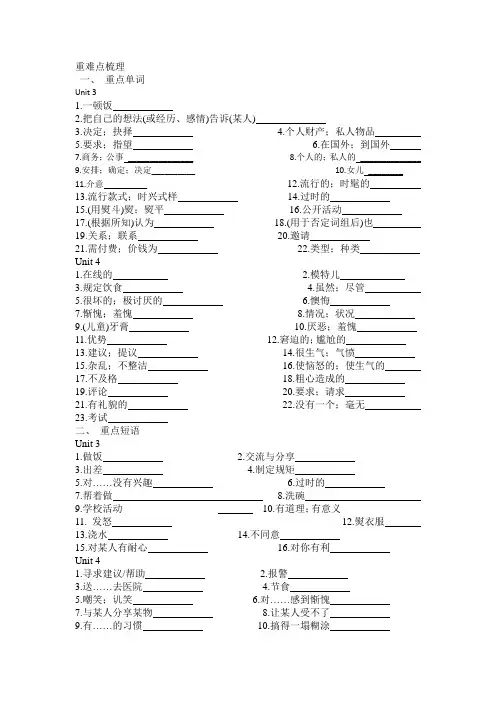
重难点梳理一、重点单词Unit 31.一顿饭2.把自己的想法(或经历、感情)告诉(某人)3.决定;抉择4.个人财产;私人物品5.要求;指望6.在国外;到国外7.商务;公事_______________ 8.个人的;私人的______________ 9.安排;确定;决定__________ 10.女儿________ 11.介意________ 12.流行的;时髦的13.流行款式;时兴式样14.过时的 15.(用熨斗)熨;熨平16.公开活动17.(根据所知)认为 18.(用于否定词组后)也19.关系;联系20.邀请21.需付费;价钱为22.类型;种类Unit 41.在线的2.模特儿3.规定饮食4.虽然;尽管5.很坏的;极讨厌的6.懊悔7.惭愧;羞愧8.情况;状况9.(儿童)牙膏 10.厌恶;羞愧11.优势12.窘迫的;尴尬的 13.建议;提议14.很生气;气愤15.杂乱;不整洁16.使恼怒的;使生气的17.不及格18.粗心造成的 19.评论20.要求;请求21.有礼貌的 22.没有一个;毫无23.考试二、重点短语Unit 31.做饭2.交流与分享3.出差4.制定规矩5.对……没有兴趣6.过时的7.帮着做__________________ 8.洗碗_____________________ 9.学校活动___________________ 10.有道理;有意义________________ 11. 发怒12.熨衣服13.浇水14.不同意15.对某人有耐心 16.对你有利Unit 41.寻求建议/帮助2.报警3.送……去医院4.节食5.嘲笑;讥笑6.对……感到惭愧7.与某人分享某物8.让某人受不了9.有……的习惯 10.搞得一塌糊涂11.与……吵了一架12.充满活力13.对……生气14.格格不入15.朝某人叫嚷16.与某人无关17.收到某人的信件(或电子邮件、电话等) 18下定决心19.注意;留心重点短语归纳keep away from… 远离be tired of… 厌倦…. make a decision 做决定at the age of…在……岁时be bored with…对……感到厌倦lose heart丧失信心get to到达take a message 捎口信at the moment此刻;现在be close to…靠近…at the same time同时play a joke on sb.开某人玩笑at the end of 在……末尾on business 出差have got有help with帮着做be abroad在国外out of date过时look after照顾for example例如make sense有道理such as例如give sb. a hand帮助某人make a list列出清单be patient with sb. 对某人有耐心in addition此外grow up长大communicate with sb.与某人交流ask for advice征求意见give sb. sth.= give sth. to sb.把某物给某人take sb. to...把某人带到……be worried about担心be on a diet节食make jokes取笑laugh at 取笑;嘲笑feel ashamed of对…..感到惭愧say bad things about sb. 说某人坏话drive sb. mad让某人受不了make a mess搞得一塌糊涂have a fight with sb.和某人争辩make noise 制造噪音lose weight减肥all day整天be annoyed with sb. 生某人气be afraid of 害怕next to靠近out of place格格不入shout at向……大声叫喊not… at all根本不;一点也不none one‟s of business与某人无关hear from sb. 收到某人的来信borrow sth. from sb.向某人借某物make up one‟s mind下定决心think of想起be successful成功in a few months‟ time几个月后to one‟s surprise另某人惊讶的change one‟s mind改变某人的想法句型分析考点一:Who makes most of the decisions in your family?你家里的大部分决定是谁做出的?(教第34页)※decision此处用作可数名词,意为“决定;抉择‟make decisions /a decision意为”做出决定,相当于decide。
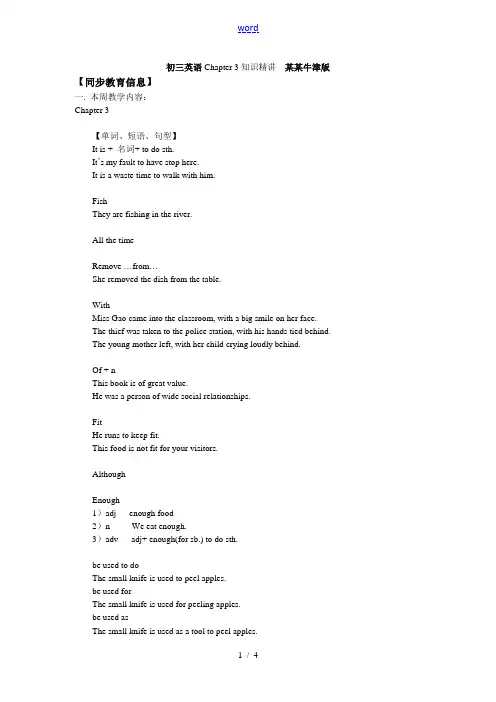
初三英语Chapter 3知识精讲某某牛津版【同步教育信息】一. 本周教学内容:Chapter 3【单词、短语、句型】It is + 名词+ to do sth.It’s my fault to have stop here.It is a waste time to walk with him.FishThey are fishing in the river.All the timeRemove …from…She removed the dish from the table.WithMiss Gao came into the classroom, with a big smile on her face.The thief was taken to the police station, with his hands tied behind.The young mother left, with her child crying loudly behind.Of + nThis book is of great value.He was a person of wide social relationships.FitHe runs to keep fit.This food is not fit for your visitors.AlthoughEnough1)adj enough food2)n We eat enough.3)adv adj+ enough(for sb.) to do sth.be used to doThe small knife is used to peel apples.be used forThe small knife is used for peeling apples.be used asThe small knife is used as a tool to peel apples.be used byThe pen name is used by a famous writer.Require1)require sb./ sth.2)Require doing3)Require sb. to do sth.4)Require + 从句Set offFrightenHangenable sb. to do sth.enable + 宾语the restthe rest of the + 名词no more/ not …any moreno longer/ not…any longersee sb. doingcut offraiseHe has a large family to raise.The farmer raises cow and corn.hatchThe chickens hatched this morning. hatch outhatch upas soon asAs soon as he es, I will tell him about it. Be proud ofIn the endAt the end ofFilm【模拟试题】(答题时间:25分钟)一、单选:1.The No.8 bus ____ to Wuhan University, and not to Hubei University.A. are goneB. is being goneC. goesD. are going2.Then the baby cormorant ____ by Damin himself.A. looks afterB. is looked afterC. is looking afterD. will look after3. I get a lot of ____ from my job.A. enjoymentB. offeringC. imaginationD. display4. He said that I had stolen his bicycle, but I ____ it.A. orderedB. claimedC. admittedD. denied5. When you go to the post office, will you please ____ some stamps back for me ?A. takeB. bringC. catchD. carry6. Many of us are ____ of just how much food and drink we need.A. unawareB. unimportantC. unableD. unforgettable7. ____ Damin’s grandson learned to deal with the raft.A. SeparatelyB. RarelyC. RoughlyD. Gradually8. The man’s ____ head was covered with sweat.A. blondB. curlyC. baldD. glutinous9. Grenblat is an excellent painter, ____ and children’s book writer.A. sculptB. sculptureC. sculptorD. sculpting10. One afternoon she ____ from the coast in a small boat and was caught in a storm.A. drove offB. turned offC. took offD. set off二、填空:11. Everything about the f____ was good. Good acting, good story, good fun.12. I’m g ____ to you for helping me.13. This kind of puter is p ____ in China.14. This book has been t ____ into several languages.15. Most plants r ____ sunlight.16. When you are planting a tree, make sure to get it s ____ .17. Schools should train students’ c ____ imagination.18. He has poor e ____ and can not read easily.19. Wearing the dress in the latest s ____ she looks even more beautiful.20. The doctor e ____ her carefully and asked her to have a good rest.【试题答案】一、单选:1—5 C B A D B 6—10 A D C C D二、填空:11. film 12. grateful 13. produced 14. translated 15. require 16. straight 17. creative 18. eyesight 19. style 20. examined【励志故事】乘奇而入45年前,联邦德国的福斯汽车公司准备入主美国汽车大市场,此前曾派出大批人马做了一番细致入微的市场调查研究。
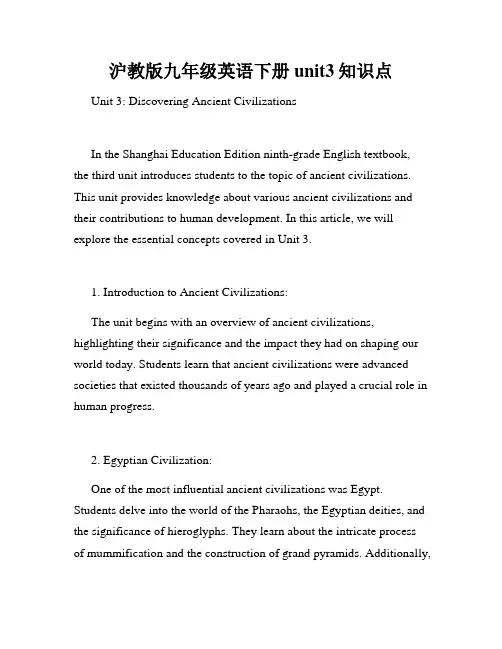
沪教版九年级英语下册unit3知识点Unit 3: Discovering Ancient CivilizationsIn the Shanghai Education Edition ninth-grade English textbook, the third unit introduces students to the topic of ancient civilizations. This unit provides knowledge about various ancient civilizations and their contributions to human development. In this article, we will explore the essential concepts covered in Unit 3.1. Introduction to Ancient Civilizations:The unit begins with an overview of ancient civilizations, highlighting their significance and the impact they had on shaping our world today. Students learn that ancient civilizations were advanced societies that existed thousands of years ago and played a crucial role in human progress.2. Egyptian Civilization:One of the most influential ancient civilizations was Egypt. Students delve into the world of the Pharaohs, the Egyptian deities, and the significance of hieroglyphs. They learn about the intricate processof mummification and the construction of grand pyramids. Additionally,students explore the Nile River and its importance as the lifeblood of ancient Egyptian civilization.3. Mesopotamian Civilization:Moving on, students are introduced to the Mesopotamian civilization, considered one of the earliest known civilizations in history. Through engaging activities and readings, students discover the significance of the Tigris and Euphrates rivers in Mesopotamia's development. They also learn about the invention of writing systems such as cuneiform and the code of Hammurabi, which laid the foundation for the rule of law.4. Ancient Chinese Civilization:Next, students explore the rich history of ancient China. They learn about the Shang dynasty and its contributions, such as the development of early Chinese writing, bronze casting, and oracle bone inscriptions. Students dive into the fascinating world of Chinese philosophy, including Confucianism and Taoism, gaining a deeper understanding of the cultural heritage that continues to influence Chinese society today.5. Indus Valley Civilization:The unit also covers the Indus Valley Civilization, located in what is now modern-day Pakistan and northwest India. Students examine the complex urban planning of this ancient civilization, including the well-organized cities and advanced drainage systems. They also explore the mystery surrounding the Indus Valley script that is yet to be fully deciphered.6. Comparing Ancient Civilizations:To provide students with a broader perspective, this unit includes comparative analysis of ancient civilizations. Through various activities and discussions, students develop critical thinking skills by examining the similarities and differences among different ancient civilizations. This comparative approach helps foster a global understanding of human history and its complexities.7. Legacy of Ancient Civilizations:Lastly, this unit emphasizes the enduring legacies of ancient civilizations. Students reflect on the impacts of these civilizations on modern human society, acknowledging their contributions to art, architecture, literature, and societal structures. Students are encouraged to appreciate the importance of preserving cultural heritage and the lessons we can learn from the achievements and failures of our ancient ancestors.Through Unit 3, students not only gain historical knowledge about ancient civilizations but also develop essential skills such as critical thinking, cultural understanding, and a sense of appreciation for the diverse heritage of human civilization. The unit encourages students to explore and appreciate the complexities and interconnectedness of ancient civilizations and their lasting influence on our contemporary world.。
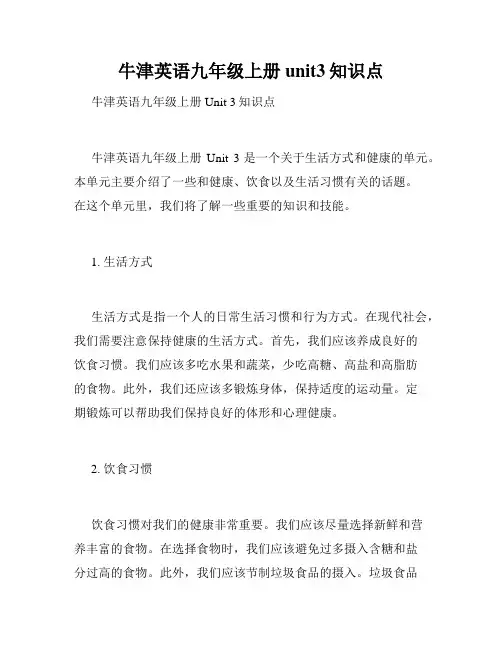
牛津英语九年级上册unit3知识点牛津英语九年级上册Unit 3知识点牛津英语九年级上册Unit 3是一个关于生活方式和健康的单元。
本单元主要介绍了一些和健康、饮食以及生活习惯有关的话题。
在这个单元里,我们将了解一些重要的知识和技能。
1. 生活方式生活方式是指一个人的日常生活习惯和行为方式。
在现代社会,我们需要注意保持健康的生活方式。
首先,我们应该养成良好的饮食习惯。
我们应该多吃水果和蔬菜,少吃高糖、高盐和高脂肪的食物。
此外,我们还应该多锻炼身体,保持适度的运动量。
定期锻炼可以帮助我们保持良好的体形和心理健康。
2. 饮食习惯饮食习惯对我们的健康非常重要。
我们应该尽量选择新鲜和营养丰富的食物。
在选择食物时,我们应该避免过多摄入含糖和盐分过高的食物。
此外,我们应该节制垃圾食品的摄入。
垃圾食品通常含有大量的脂肪、盐和糖,过量摄入会给我们的身体健康带来负面影响。
3. 心理健康心理健康对我们的整体健康非常重要。
在现代社会中,我们经常面临各种各样的压力。
我们应该学会应对压力,保持良好的心理状态。
有许多方法可以帮助我们改善心理健康,如培养良好的兴趣爱好,与亲友交流等。
此外,我们还可以通过阅读、听音乐和参加正面的社交活动来放松自己,缓解压力。
4. 健康饮食的重要性健康饮食对我们的身体健康非常重要。
一个均衡的饮食可以提供我们所需的养分,保持我们的身体功能正常。
我们应该尽量摄入各种各样的食物,如谷物、蔬菜、水果、蛋白质和脂肪。
此外,我们应该控制食物的份量和食用频率,避免过量摄入食物。
5. 锻炼对健康的影响适度的锻炼对我们的健康有着重要的影响。
锻炼可以增强我们的心肺功能,提高身体的代谢率。
适当的锻炼可以消耗多余的热量,帮助我们保持健康的体形。
此外,锻炼还可以改善我们的心理健康,减轻焦虑和抑郁的症状。
总结起来,牛津英语九年级上册Unit 3主要介绍了一些和健康、饮食以及生活习惯有关的话题。
通过学习这些知识点,我们可以更好地了解如何保持良好的生活方式,提高我们的健康水平。
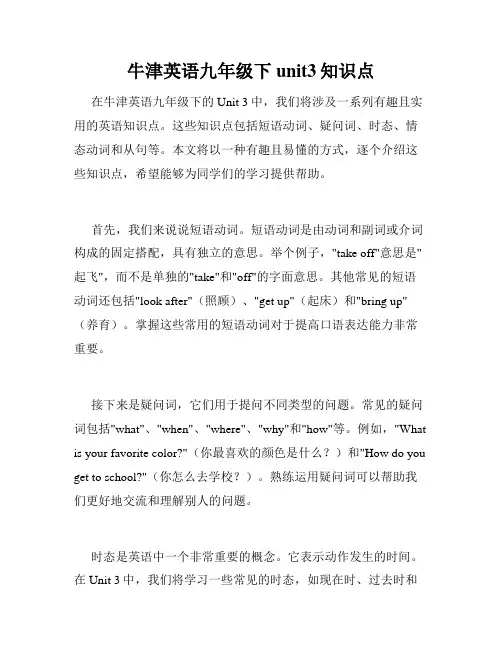
牛津英语九年级下unit3知识点在牛津英语九年级下的Unit 3中,我们将涉及一系列有趣且实用的英语知识点。
这些知识点包括短语动词、疑问词、时态、情态动词和从句等。
本文将以一种有趣且易懂的方式,逐个介绍这些知识点,希望能够为同学们的学习提供帮助。
首先,我们来说说短语动词。
短语动词是由动词和副词或介词构成的固定搭配,具有独立的意思。
举个例子,"take off"意思是"起飞",而不是单独的"take"和"off"的字面意思。
其他常见的短语动词还包括"look after"(照顾)、"get up"(起床)和"bring up"(养育)。
掌握这些常用的短语动词对于提高口语表达能力非常重要。
接下来是疑问词,它们用于提问不同类型的问题。
常见的疑问词包括"what"、"when"、"where"、"why"和"how"等。
例如,"What is your favorite color?"(你最喜欢的颜色是什么?)和"How do you get to school?"(你怎么去学校?)。
熟练运用疑问词可以帮助我们更好地交流和理解别人的问题。
时态是英语中一个非常重要的概念。
它表示动作发生的时间。
在Unit 3中,我们将学习一些常见的时态,如现在时、过去时和将来时。
现在时表示现在正在进行的动作,过去时表示过去发生的动作,将来时表示将来要发生的动作。
我们可以通过动词的变化来表示不同的时态。
例如:"I am reading a book."(我正在看书,现在进行时)和"She went to the cinema yesterday."(她昨天去了电影院,过去时)。
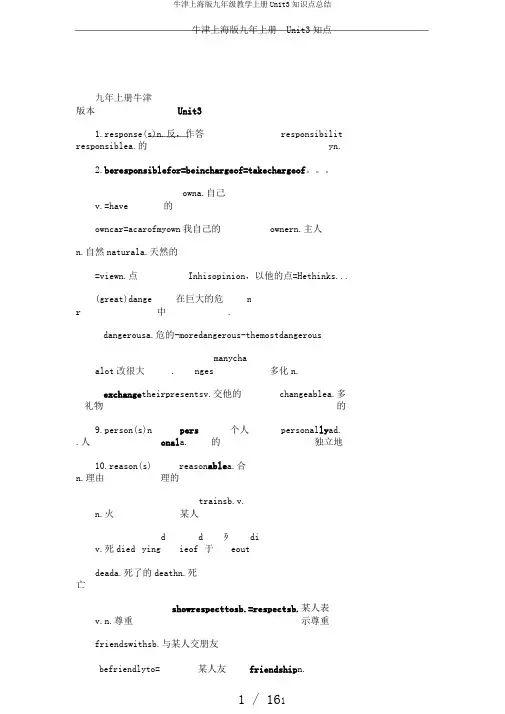
牛津上海版九年上册Unit3知点九年上册牛津版本Unit31.response(s)n.反,作答responsiblea.的responsibilityn.2.beresponsiblefor=beinchargeof=takechargeof。
v.=have有owna.自己的owncar=acarofmyown我自己的ownern.主人n.自然naturala.天然的=viewn.点Inhisopinion,以他的点=Hethinks...(great)dange r在巨大的危中n.dangerousa.危的-moredangerous-themostdangerousalot改很大.manychanges多化n.exchange theirpresentsv.交他的礼物changeablea.多的9.person(s)n .人personal a.个人的personal ly ad.独立地10.reason(s) n.理由reason able a.合理的n.火trainsb.v.某人v.死dieddyingdieof死于dieoutdeada.死了的deathn.死亡v.n.尊重showrespecttosb.=respectsb.某人表示尊重friendswithsb.与某人交朋友befriendlyto=某人友friendship n.bekindto好的友v.咬hide-hid-hiddenv.藏v.choicen.高的a.unhappy不高a.happil y 高地ad.happiness幸福n.不健康unusual不常的unlucky不幸运的unnecessary不重要的a.有空的,免的,自由的free dom n.自由1.expense(s)n.用collegeexpenses大学用(high/low) expensivea.昂的moreexpensive-themostexpensiven.信心,信任havefaithin⋯有信念faithful忠的a.faithfully忠地ad.3.extremely=very/quite=terribly= completelyad.非常sb.v.使某人惊tooursurprisen.使我惊的是5.surprising/amazingn ewsa.令人异的消息6.besurprised/ama zedata.。
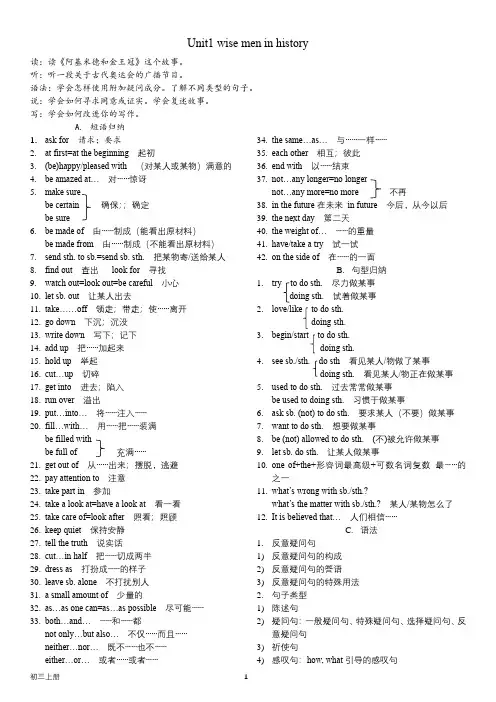
Unit1 wise men in history 读:读《阿基米德和金王冠》这个故事。
听:听一段关于古代奥运会的广播节目。
语法:学会怎样使用附加疑问成分。
了解不同类型的句子。
说:学会如何寻求同意或证实。
学会复述故事。
写:学会如何改进你的写作。
A.短语归纳1.ask for 请求;要求2.at first=at the beginning 起初3.(be)happy/pleased with (对某人或某物)满意的4.be amazed at… 对……惊讶5.make surebe certain 确保;;确定be sure6.be made of 由……制成(能看出原材料)be made from 由……制成(不能看出原材料)7.send sth. to sb.=send sb. sth. 把某物寄/送给某人8.find out 查出look for 寻找9.watch out=look out=be careful 小心10.let sb. out 让某人出去11.take……off 领走;带走;使……离开12.go down 下沉;沉没13.write down 写下;记下14.add up 把……加起来15.hold up 举起16.cut…up 切碎17.get into 进去;陷入18.run over 溢出19.put…into… 将……注入……20.fill…with… 用……把……装满be filled withbe full of 充满……21.get out of 从……出来;摆脱,逃避22.pay attention to 注意23.take part in 参加24.take a look at=have a look at 看一看25.take care of=look after 照看;照顾26.keep quiet 保持安静27.tell the truth 说实话28.cut…in half 把……切成两半29.dress as 打扮成……的样子30.leave sb. alone 不打扰别人31.a small amount of 少量的32.as…as one can=as…as possible 尽可能……33.both…and… ……和……都not only…but also… 不仅……而且……34.the same…as… 与……一样……35.each other 相互;彼此36.end with 以……结束37.not…any longer=no longernot…any more=no more 不再38.in the future在未来in future 今后,从今以后39.the next day 第二天40.the weight of… ……的重量41.have/take a try 试一试42.on the side of 在……的一面B.句型归纳1.try to do sth. 尽力做某事doing sth. 试着做某事2.love/like to do sth.doing sth.3.begin/start to do sth.doing sth.4.see sb./sth. do sth 看见某人/物做了某事doing sth. 看见某人/物正在做某事ed to do sth. 过去常常做某事be used to doing sth. 习惯于做某事6.ask sb. (not) to do sth. 要求某人(不要)做某事7.want to do sth. 想要做某事8.be (not) allowed to do sth. (不)被允许做某事9.let sb. do sth. 让某人做某事10.one of+the+形容词最高级+可数名词复数最……的之一11.what’s wrong with sb./sth.?what’s the matter with sb./sth.? 某人/某物怎么了12.It is believed that… 人们相信……C.语法1.反意疑问句1)反意疑问句的构成2)反意疑问句的答语3)反意疑问句的特殊用法2.句子类型1)陈述句2)疑问句:一般疑问句、特殊疑问句、选择疑问句、反意疑问句Unit2 Great minds读:读一个关于爱因斯坦和他的司机的小故事。
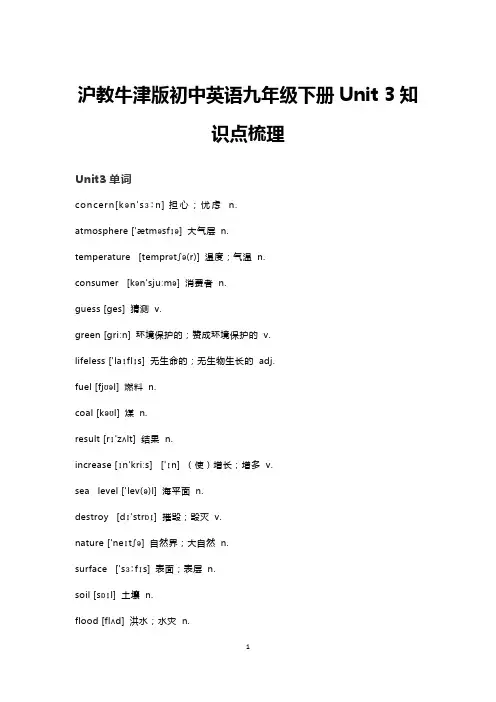
沪教牛津版初中英语九年级下册Unit 3知识点梳理Unit3单词concern[kən'sɜːn] 担心;忧虑n.atmosphere ['ætməsfɪə] 大气层n.temperature [temprətʃə(r)] 温度;气温n.consumer [kən'sjuːmə] 消费者n.guess [ges] 猜测v.green [griːn] 环境保护的;赞成环境保护的v.lifeless ['laɪflɪs] 无生命的;无生物生长的adj.fuel [fjʊəl] 燃料n.coal [kəʊl] 煤n.result [rɪ'zʌlt] 结果n.increase [ɪn'kriːs] ['ɪn] (使)增长;增多v.sea level ['lev(ə)l] 海平面n.destroy [dɪ'strɒɪ] 摧毁;毁灭v.nature ['neɪtʃə] 自然界;大自然n.surface ['sɜːfɪs] 表面;表层n.soil [sɒɪl] 土壤n.flood [flʌd] 洪水;水灾n.habit ['hæbɪt] 习惯n.proper ['prɒpə] 正确的;恰当的adj.friendly ['fren(d)lɪ] 无害的adj.recycle [riː'saɪk(ə)l] 回收利用v.purpose ['pɜːpəs] 目的;用途n.solution [sə'luːʃ(ə)n] 解决办法;处理手段n.government ['ɡʌvɚnmənt] 政府n.role model ['mɒdl] 楷模;行为榜样n.greenhouse effect 温室效应in danger 在危险中as a result of 由于result in 造成;导致mountains of 许多;大量take action 采取行动make a difference 有作用;有影响act as 充当Unit3课文The world is in danger世界正处于危险之中Our world is in danger.We must do something to protect the environment.But, what are the main problems we face?我们的世界正处于危险之中。
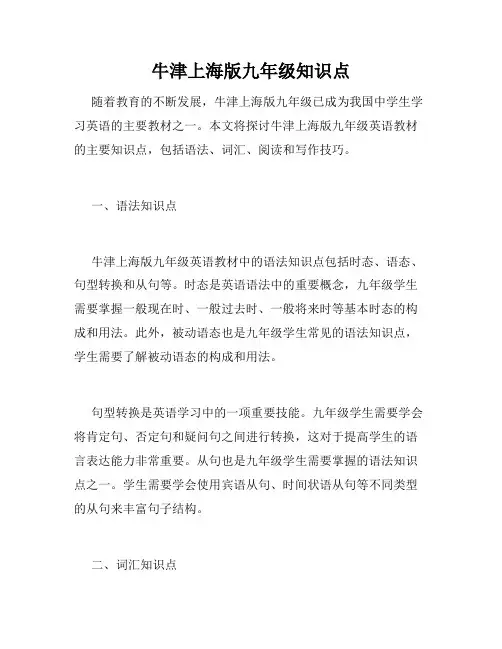
牛津上海版九年级知识点随着教育的不断发展,牛津上海版九年级已成为我国中学生学习英语的主要教材之一。
本文将探讨牛津上海版九年级英语教材的主要知识点,包括语法、词汇、阅读和写作技巧。
一、语法知识点牛津上海版九年级英语教材中的语法知识点包括时态、语态、句型转换和从句等。
时态是英语语法中的重要概念,九年级学生需要掌握一般现在时、一般过去时、一般将来时等基本时态的构成和用法。
此外,被动语态也是九年级学生常见的语法知识点,学生需要了解被动语态的构成和用法。
句型转换是英语学习中的一项重要技能。
九年级学生需要学会将肯定句、否定句和疑问句之间进行转换,这对于提高学生的语言表达能力非常重要。
从句也是九年级学生需要掌握的语法知识点之一。
学生需要学会使用宾语从句、时间状语从句等不同类型的从句来丰富句子结构。
二、词汇知识点牛津上海版九年级英语教材中的词汇知识点是学生进行词汇积累的重要来源。
九年级学生需要掌握丰富的词汇量,包括常用的动词、名词、形容词和副词等。
此外,学生还需要学会词义辨析和词性转换等技巧,这将有助于提高学生的词汇运用能力。
三、阅读知识点牛津上海版九年级英语教材中的阅读知识点包括理解文章主旨、推理判断、按顺序排列信息等。
学生需要培养阅读理解的能力,学会从文章中提取关键信息,理解文章的主题和中心思想。
同时,学生还需要学会根据文章内容进行推理和判断,增强自己的逻辑思维能力。
四、写作技巧写作是英语学习中的一个重要环节,也是牛津上海版九年级英语教材的重点之一。
九年级学生需要学会书写不同类型的作文,包括记叙文、说明文和议论文等。
在写作过程中,学生需要注意文章的结构、语法准确性和语言的连贯性。
同时,学生还需要培养自己的思维能力和创造力,使作文更具内容和表达的独特性。
总结起来,牛津上海版九年级英语教材涵盖了广泛的语法、词汇、阅读和写作技巧。
通过对这些知识点的掌握和应用,学生可以提高自己的英语水平,增强语言表达和交流能力。
希望九年级学生能够善用教材资源,努力学习,取得优异的成绩。
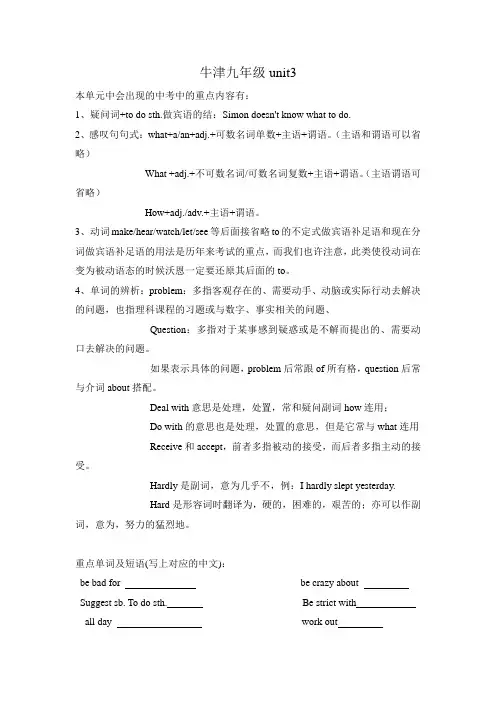
牛津九年级unit3本单元中会出现的中考中的重点内容有:1、疑问词+to do sth.做宾语的结:Simon doesn't know what to do.2、感叹句句式:what+a/an+adj.+可数名词单数+主语+谓语。
(主语和谓语可以省略)What +adj.+不可数名词/可数名词复数+主语+谓语。
(主语谓语可省略)How+adj./adv.+主语+谓语。
3、动词make/hear/watch/let/see等后面接省略to的不定式做宾语补足语和现在分词做宾语补足语的用法是历年来考试的重点,而我们也许注意,此类使役动词在变为被动语态的时候沃恩一定要还原其后面的to。
4、单词的辨析:problem:多指客观存在的、需要动手、动脑或实际行动去解决的问题,也指理科课程的习题或与数字、事实相关的问题、Question:多指对于某事感到疑惑或是不解而提出的、需要动口去解决的问题。
如果表示具体的问题,problem后常跟of所有格,question后常与介词about搭配。
Deal with意思是处理,处置,常和疑问副词how连用;Do with的意思也是处理,处置的意思,但是它常与what连用Receive和accept,前者多指被动的接受,而后者多指主动的接受。
Hardly是副词,意为几乎不,例:I hardly slept yesterday.Hard是形容词时翻译为,硬的,困难的,艰苦的;亦可以作副词,意为,努力的猛烈地。
重点单词及短语(写上对应的中文):be bad for be crazy aboutSuggest sb. To do sth. Be strict withall day work outQuarrel with sb.about sth. Hand ingive up from time to timePay attention to turn offdo well in give sb. AdviceBe worth doing sth. Stay outstay up stay awayStay at home deal with随堂练:牛津英语9A Unit3 检测试卷(1)一.词汇1. I have no ___________ (亲密的) friends so I can’t share my secrets with others.2. Yesterday I received a gift but I didn’t (接受) it.3. This article is of great (价值) to us.4. I wish I could have my mother’s _________(支持).5. Eating too much makes you __________(不健康的).6. We should learn how to (获得)a balance between work and play.7. He is studying for exams. Don’t (打扰) him.8. My father (允许) me to watch TV once a week in the past9. Stamp collecting is one of my _________(爱好).10. I can’t go shopping with you because I haven’t (完成)my homework yet.二.选择填空( ) 1. We should be strict _______ ourselves ______ our work..A. in, withB. with, inC. with, onD. on, with( ) 2. __________ you offered him !A. How useful adviceB. What a useful adviceC. How a useful adviceD. What useful advice( ) 3. Can you tell me ________ first, my homework or my favourite hobby ?A. which to doB. who to doC. when to doD. where to do( ) 4. Taking enough exercise ___________ good for your health.A. beB. isC. areD. maybe( ) 5. The host was asked _________ his free time.A. how to deal withB. how to solveC. what to deal withD. how to do( ) 6. I haven’t ________ him since he left school.A. hear fromB. heard a letter fromC. heard fromD. heared from( ) 7. His father has gone to America. He’ll stay there for ____________.A. some timeB. sometimeC. sometimesD. some times( ) 8. It is so _____here that he can’t do his homework.A. noisyB. noiseC. noisierD. noisily( ) 9. Mr. White seems ________ a lot of money.A. to haveB. haveC. havingD. has( ) 10. You couldn’t work out the Math problem. I couldn’t __________.A. tooB. alsoC. yetD. either( ) 11. Maybe I have heard of the story before, but I can remember it. A. hardly B. really C. mostly D. easily( ) 12. The terrible noise from the man’s room simply me mad.A. putB. droveC. causedD. turned( )13. --Would you like some coffee?--Yes, and please get me some milk, too. I prefer coffee_____ milk.A. withB. ofC. toD. than( ) 14. He __________ Tom’s sister, Kitty.A. maybeB. perhapsC. may beD. may is( ) 15. I don’t think students under18 should to go to net bars (网吧). A. allow B. allowed C. be allowed D. be allowing三.用所给词组的适当形式填空achieve a balance ,complete ,deal with , laugh at, revise for,argue with, pay no attention to , all day , stay out late , hand in1. Our teachers always ask us _____________ our homework on time.2. ____________________ the disabled people is impolite.3. It’s very difficult for me ______________ this problem.4. Please tell me how __________________ between my study and hobby.5. Don’t ______________ alone. It is very dangerous for the children.6. Nancy feels sad because her parents work ___________ and they don’t have time for her.7. I told her to ___________________ the students who laugh at her.8. Last night he would rather watch TV than ___________ his lessons.9. Simon felt so tired that he couldn’t _____________ his homework. on time10. They __________________ each other about their family now.四.词形变换1. You must g ive up_____________(play) computer games, or you’ll fail in the exam.2. I read about one of his articles on___________(teen) problems in the newspaper.3. Why not ____________(send) an e-mail to her instead of replying to her letter?4. We think it _________(necessary) to give students tests every day. If so, the students will be very tired.5. I feel __________(stress) from time to time.6.Are you crazy about ______________( watch) films?7. ______________(hand) in your homework on time, or your teacher will be angry with you.8. It’s my pleasure to give you some useful ________________(suggest).9. Don’t make any _____________(noisy) any more.10.The problem of stress gets _________________(bad) when people don’t sharetheir problems.五.完形填空Have you ever asked yourself why children go to school? You will probably 1 they go to school to learn languages, geography, history, science and all 2 subjects. That is quite true, but 3 do they learn these things?We send our children to school to 4 them for their future work and life. Nearly 5 they study at school has some practical use 6 their life, but is that the 7 reason they go to school?There is 8 in education than just learning facts. We go to school above all (首先) to learn how to learn, 9 when we leave school we can go on learning. If a man really knows 10 to learn, he will be successful, because whenever he has to do 11 he will quickly teach 12 how to do it in the best way. The uneducated(未受教育的)person, on the other hand(另一方面), is 13 unable to do it, or does badly. So the purpose of school is not just 14 languages, geography, science etc., but to teach pupils the 15 to learn. Do you think so?( ) 1. A. speak B. say C. talk D. tell( ) 2. A. the B. another C. the other D. others( ) 3. A. how B. where C. why D. what( )4.A. stop B. ask C. ready D. prepare( )5.A. nothing B. all things C. everyone D. everything( ) 6. A. at B. in C. on D. with( ) 7. A. best B. only C. just D. first( ) 8. A. many B. much C. more D. most( ) 9. A. so that B. if C. though D. but( )10. A. how B. why C. what D. when( )11. A. anything new B. something new C. new everythin D. old nothing ( )12. A. he B. his C. him D. himself( )13. A. both B. either C. neither D. not( )14. A. learn B. to learn C. teach D. to teach( )15.A. subjects B. Reasons C. ways D. knowledge 六.阅读理解Young people and older pe ople don’t always agree. They sometimes have different ideas about living, working and playing. But in one special programme in New York State, adults and teenagers live together in a friendly way.Each summer 200 teenagers and 50 adults live together for eight weeks as members of a special work group. Everyone works several hours each day. They do so not just to keep busy but to find meaning and enjoyment in work. Some teenagers work in the woods (树林)or on the farms near the village. Some learn to make things like tables and chairs and build houses. The adults teach them these skills.There are several free hours each day. Weekends are free, too. During the free hours some of the teenagers learn photo-taking or painting. Others sit around and talk or sing. Each teenager chooses his own way to spend his free time.When people live together, rules(规则,制度) are necessary. In this programme theteenagers and the adults make the rules together. If someone breaks a rule, the problem goes before the whole group. They talk about it and ask, “Why did it happen? What should we do about it?”One of the teenagers has this to say about his experience, “You stop thinking only about yourself, You learn to think about the group.”( )1. In one special programme in New York State, young and older people _______ .A. don’t work well together.B. are friendly to one another.C. teach one another new ways of building houses.D. spend eight weeks together, working as farmers..( )2. All the members work some time every day mainly to _______ .A. lead a busy life.B. learn new skills of farmingC. get used to the life on the farmsD. find value and pleasure in work( )3. Living together, _________ .A. the teenagers don’t have to obey the rulesB. the teenagers have to obey the rules the adults makeC. the members have no free time on weekendsD. the members are not allowed to break the rules they make together( )4. The last paragraph shows that the teenager thinks his experience in the programme is _________ .A. unpleasantB. tiringC. helpingD. boring( )5. The best title for the passage is __________ .A. The rules of living togetherB. Life in New York StateC. Teenagers in the special groupD. Free hours in the special work group七.句子翻译1.我们喜欢在外踢足球到很晚。
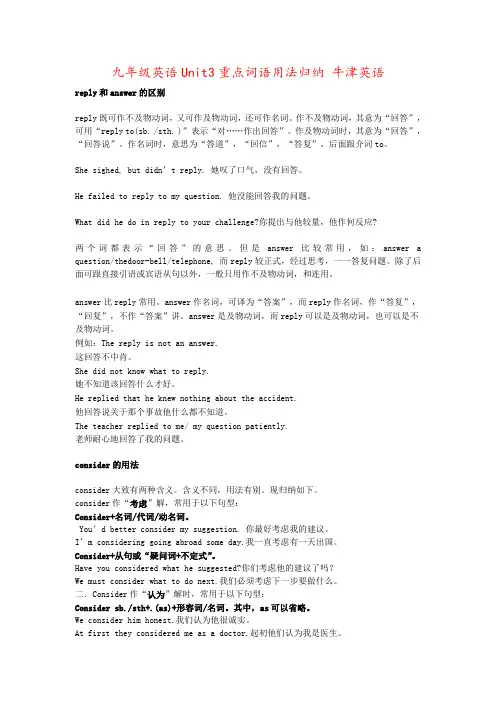
九年级英语Unit3重点词语用法归纳牛津英语reply和answer的区别reply既可作不及物动词,又可作及物动词,还可作名词。
作不及物动词,其意为“回答”,可用“reply to(sb. /sth. )”表示“对……作出回答”。
作及物动词时,其意为“回答”,“回答说”。
作名词时,意思为“答道”,“回信”,“答复”,后面跟介词to。
She sighed, but didn’t reply. 她叹了口气,没有回答。
He failed to reply to my question. 他没能回答我的问题。
What did he do in reply to your challenge?你提出与他较量,他作何反应?两个词都表示“回答”的意思。
但是answer比较常用,如:answer a question/thedoor-bell/telephone, 而reply较正式,经过思考,一一答复问题。
除了后面可跟直接引语或宾语从句以外,一般只用作不及物动词,和连用。
answer比reply常用。
answer作名词,可译为“答案”,而reply作名词,作“答复”,“回复”,不作“答案”讲。
answer是及物动词,而reply可以是及物动词,也可以是不及物动词。
例如:The reply is not an answer.这回答不中肯。
She did not know what to reply.她不知道该回答什么才好。
He replied that he knew nothing about the accident.他回答说关于那个事故他什么都不知道。
The teacher replied to me/ my question patiently.老师耐心地回答了我的问题。
consider的用法consider大致有两种含义。
含义不同,用法有别。
现归纳如下。
consider作“考虑”解,常用于以下句型:Consider+名词/代词/动名词。
九年级英语Chapter 3 A success story某某牛津版【本讲教育信息】一. 教学内容:Chapter 3 A success storyReading 1(一)课文重点单词(二)课文阅读理解二. 知识总结与归纳:(一)课文重点单词、短语1. abandon vt.抛弃The baby was abandoned by its mother.We abandoned our holiday because we had no money.2. admire v.欣赏I was admiring your new car.3. ambitious adj.有志向的Mary is an ambitious girl.4. burning adj. 激烈的She didn’t lose her burning desire to develop herself.5. career n. 职业,生涯Winning the petition gave her a chance to star on a new career path.6. contest n. 竞赛,比赛She entered the writing contest and won it.7. cosmetic n. 化妆品It is bad for children to use cosmetic.8. countless adj. 无数的There are countless stars in the sky at night. It is hard to count them.9. degree n. 学位She then studied for a Fine Arts degree at University of Hong Kong.10. extraordinary adj. 非凡的The boy has an extraordinary imagination.11. fame n. 名望His invention brought him fame as well as money.12. fortunately adv. 幸运地Fortunately, he got the tickets for the concert in advanced.13. graduate v. 毕业She graduated from a French university.14. independent adj. 独立的His wages enabled him to be economically independent of his family.15. praise v. 称赞We all praised him for his honest.16. succeed v. 成功I hope that you will succeed in your efforts.17. wander v. 徘徊He wandered up and down the road aimlessly.18. syllabus n. 教学大纲We should carry out our teaching according to the syllabus.19. available adj. 可用的,可看到的Is the doctor available?20. industrialize v. 使得……工业化It will take many years to industrialize all parts of country.21. poverty n. 贫穷There are still many people living in poverty in some developing countries.22. squatter n. 擅自占用公地的人Some squatters live in the old buildings without paying rent.23. vacuum v. 用吸尘器打扫Do you vacuum the floor at home?(二)课文阅读理解阅读课文,用时5分钟。
九年级英语Chapter 3 A success storyReading 2某某牛津版【本讲教育信息】一. 教学内容:Chapter 3 A success storyReading2(一)课文语言点归纳(二)重点句型及释义(三)课文阅读理解二. 知识总结与归纳:(一)课文语言点归纳1. bring up 培养We must train and bring up millions of successors to our cause.She always brings up her children to be considerate of others.2. on everyone’s lipsNow her stories were on everyone’s lips.3. give somebody’s a hand 帮忙He would always give a hand to anyone in difficulty.4. devote…to=give…pletely toSince he began to work as a teacher, he has devoted a lot of time to teaching.5. know / know of / know aboutDo you know Mr Johnson?No, but I know of him.My brother knows about cars. I’m sure he can fix it for you.6. enter / enter intoHe entered the university at 18.Hearing the bell, the students entered the classroom.He entered into an argument with his assistant.We entered into a contract with a fir.Oxygen enters into many pound bodies.(二)重点句型及释义1. Arthur was responsible for writing stories about successful people for the school newspaper.successful adj. 成功的successfully adv. 成功地success n. 成功succeed v. 成功succeed in doingIn one night, they succeeded in capturing it by a trick.2. Mary entered the contest because she was ambitious and because and wanted to show that orphanage girl could be something.ambitious adj. 有雄心的ambition n. 抱负My ambition is to be an engineer.could be something 被人尊重3. Winning the petition brought her more than fame.fame n. 名气famous adj. 著名的4. Since 1987, she has devoted a lot of her to photograph.Since 1990, she has been an English teacher.=She has been an English teacher for about 18 years.=She began to teach English in 1990.(三)课文阅读理解P34 D1D2D3【模拟试题】(答题时间:40分钟)一、翻译短语1. 对……负责2. 特别的事情3. 转折点4. 众人皆知5. 参加比赛6. 给某人一个机会7. 致力于…… 8. 在街上徘徊二、单词拼写1. She makes up her mind about everything. She is very __________.2. The girl was unlucky. She was __________ by her parents when she was born.3. In 1975, Mary __________ the Miss Hong Kong contest and won it.4. Developing myself is my burning __________.5. Please remember __________ an email to my brother for me tonight.三、改写句子1. My parents used to live in the country. (对划线部分提问)__________ __________ my parents use to live?2. None of us is a woman cook. (改为肯定句)__________ of us are __________ cooks.3. You can’t watch TV unless you finish your homework. (改为同义句)__________ you __________ finish your homework, you can’t watch TV.4. I don’t believe the Smiths have been to the Great Wall. (改为反意疑问句)I don’t believe the Smiths have been to the Great Wall, __________ __________?5. I want to buy a house. Its windows face south. (合并为一句)I want to buy a house __________ __________ face south.四、阅读并回答问题All over the world people enjoy sports. Sports help people to keep healthy, happy and help them to live longer.Sports change with reason. People play different games in winter and summer. Games and sports often grow out of people’s work and everyday activities. They Arabs use horses or camels in much of their everyday life; they use them in their sports, too.Some sports are so interesting that people everywhere go in for them. Footballfor example, has spread around the world. Swimming is popular in all countries near the sea or in those with many rivers.Some sports or games go back thousands of years,like running or jumping. Chinese boxing, for example, has a very long history. But basketball and volleyball are rather new. Neither one is a hundred years yet. People are inviting new sports or games all the time.People from different countries may not understand each other, but after a game they often bee good friends. Sports help to train a person’s character. One learns to fight hard but fight fair, to win without pride and to lose with grace(文雅).1. What can sports help people?_________________________________________________________________.2. Do the Japanese people usually use the camels or horses in their sports? _________________________________________________________________.3. Swimming is popular in all countries near the sea orin those with many rivers. How about skating or skiing?_________________________________________________________________.4. Which of the sports has a longer history, running or basketball?_________________________________________________________________.5. How can sports help to train a person’s character?_________________________________________________________________.试题答案一. 翻译短语:1. be responsible for2. something extraordinary3. turning point4. be on everyone’s lips5. enter the contest6. give somebody a chance7. devote…to8. wander the street二. 单词拼写:1. independent2. abandoned3. entered4. desire5. to send三. 改写句子:1. Where, did2. All, women3. If, don’t4. have they5. whose windows四. 阅读并回答问题:1. It can help people to keep healthy, happy and live longer2. No3. They are popular in the places where it’s very cold in winter with much snow or ice4. Running5. One learns to fight hard but fight fair, to win without pride and to lose with grace.。
U3重点词汇1. responsibility n. 责任responsible adj. 负责的;承担义务的be responsible for 对….负责的2. death n. 死,死亡die v. 死dead adj. 死的dying adj. 临终的;垂死的3. respect v. 慎重对待;尊重respect n. 尊重;尊敬respectable adj. 体面地;值得尊敬的respectful adj. 表示敬意的;尊敬的4. faithfully adv. 忠诚地;忠实地faithful adj. 忠诚的;忠实的faith n. 信任;相信5. extremely adv. 极其;非常extreme adj. 极度的;极大的6. unhappy adj. 不快乐的;不幸福的;悲伤的unhappiness n. 忧愁;苦恼unhappily adv. 不高兴地happy adj. 高兴得7. surprised adj. 惊讶的surprise n. 惊奇v. 使…惊奇surprising adj. 令人吃惊的be surprised at 想不到;吃惊于to one’s surprise 使…感到惊奇的是8. shock adj. 震惊的shock n. 令人震惊的事v. 使震惊shocking adj. 令人震惊的9. certain adj. 一定量的certainly adv. 确定地;当然;行10. in one’s opinion 在某人看来11. make a complaint 投诉complain (to somebody) about something 向某人投诉某事12. be wrong with 有问题;有毛病I词形转换:1. A careless driver and the terrible weather were responsible for the man’s________. (die)2.Ben promised to keep the secret for his sister, Kitty. (faithful)3.The old woman feels ______because only a few young people would like to learnpaper cutting. (happy)4.With the development of China, Chinese has become an international languageand is ________ used all over the world. (wide)5.The ____________ of the camp site has not been decided yet. (locate)6.Susan is__________ sorry for what she has done. (terrible)7.Mr. Smith is a good teacher and he does his work with_________ . (please)8.The weather all over the world becomes more ______ than before .( change )9.If you don't like the products, feel free to make a to the manager.(complain)10.The doctor made an ________ to the patient’s relatives for his mistake in theoperation.(apologize)II.句型转换1.You should memorize your password(密码). It’s very important. (两句合并为一句)(闸北区)It’s very important _________ you _________ memorize your password.2.Stefan usually spends nearly one month travelling around the world every year.(保持句意基本不变)It usually _______ Stefan nearly one month _______ travel around the world every year.3.Work harder, or you'll not succeed in your new job. (保持句意基本不变) (杨浦)work harder, you'll not succeed in your new job.4.Mr. Zhang is not only our teacher but also our friend.(保持原句意思基本不变)长宁区09Mr. Zhang is our teacher and friend ______ ______.5.Mrs. Green moved most of the flower pots into the house last night. (改为被动语态)(普陀)Most of the flower pots __________ __________ into the house by Mrs. Green last night.KEYS:词性转换:death faithfully unhappy widely location terribly pleasure changeable complaint apology句型转换:For to takes to unless you as well were moved重要知识点1. complain v. 抱怨投诉n. complaint 可数还是不可数?(答:可数)向某人抱怨某事的两种表达法:(1)complain to sb about sth (2)make a complaint to sb about sth练习If you don't like the products, feel free to make some ______to the manager.(complain)complaints2. care v/nv. care for 照顾喜欢care about 关心在意n. take care of 照顾with great care 细心地adj. careful---副词carefully 对…小心be careful withcareless—名词carelessness练习1.All your suggestions will be discussed before we come to a decision. (careful)2.Be________ while getting off the train. The ground is wet. (carefully)3.Please take the precious glass there with ________ great care. I don't want it to be broken.A)a B) an C) the D)/carefully,careful, /3.apologize . 道歉n. apology“因为某事向某人道歉”两种表达法:(1)apologize to sb for sth (2)make an apology to sb for sth练习1.Sorry to keep you waiting for such a long time. I must say sorry for the delay. (保持句意基本不变)Sorry to keep you waiting for such a long time. I must________ ________ the delay. apologize for4.die v. 过去式died 过去分词died 现在分词dying短语:死于die of词性转换:名词death 形容词dying“将要死亡的” dead“已经死的” deadly“致命的”练习1. If you take a fish out of water, it _______________.A. dieB. diesC. dyingD. died2.Keeping pet dogs can help people learn more about life and _____.(die)Steve Jobs’ made the fans of Apple from all over the world very sad. (die) B,death,death5.review v/nn. 评论v. 复习review=go over练习1.Jack often reviews his lessons after he finishes his homework. (保持句意基本不变) Jack often __________ __________ lessons after he finishes his homework.goes over6. free adj./adv. adv. 不受束缚run free adj. 自由的n. freedom 免费的短语for free空闲的练习1. If you buy this big TV set, you can get the camera free.A) for B)on C) with D) from2. The birds in the cage hope for ____________(free)A, freedom7. open v. “打开”后必须接宾语,而且不可以和一段时间词连用反义词close/shutadj. “开着的”表示状态,可以和一段时间词可用反义词closedPS:close adj. 亲密的近的“和…离得很近”be close to练习1.The reading room in our neighbourhood is _______ from 9 a.m. to 9 p.m. on weekdays.A) open B) opens C) opened D) opening2.Keep the window _________ while you are in.A. openB. openingC. openedD. to openA A8.省略to的宾补五看:see look at watch notice observe两听hear listen to一感觉feel三使役(让)let make have注意:改成被动句to 要还原练习:1.His parents don’t let him ________television on school nights.A. watchB. to watchC. watchingD. watches2.Nowadays people can see fewer and fewer fishermen___with their cormorants. A.fished B. to fish C. fishing D. fish3.The difficult operation made the doctor very tired. (青浦)A) feel B) feels C) felt D) feeling4.When Mary saw a policeman _____, she shouted at him for help.(虹口)A. comingB. comesC. is comingD. has come5.When Shirley opened the window, she saw her mother ________ with her neighbours happily.(徐汇)A. talkingB. is talkingC. talkedD. totalk6. A funny joke made all of us laugh. (改成被动语态)All of us were ______ ______ ______ by a funny joke.A DAAA,made to laugh9. 动名词做主语,注意不能用动词原形来做主语Keeping pet dogs is a good idea._____ a pet dog is a big responsibility. (own)Owning10.keep 保持饲养(raise)Keep sb/sth doing Keep sb/sth adj Keep adj Keep doing短语:keep (sb) off sth 远离keep in touch 保持联系练习:1.House prices keep ______ these years. The government is expected to do something to control them. (杨浦)A) rising B) rise C) to rise D) rose2. Something must be done to the bird.A)turn off B)take off C)put off D)keep off3.If you want to keep __________ , you’d better have more exercise. (health)A D healthy11. memory—n. 记忆动词memorize练习:It’s very difficult to ______________ various telephone numbers. (memory) memorizeII.重要句型:①“It’s + adj. + of + sb + 不定式”表示“某人(做某事)怎么样”。